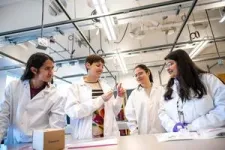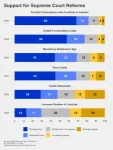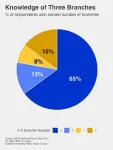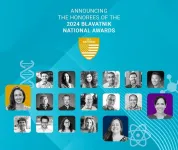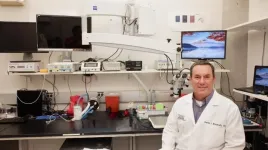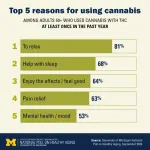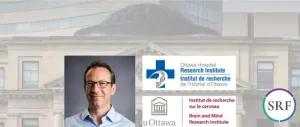(Press-News.org) A new study has revealed for the first time how different synthesis methods can profoundly impact the structural and functional properties of high entropy oxides, a class of materials with applications in everyday electronic devices. The study was published this week in the Journal of the American Chemical Society.
“The specific material that we’ve studied here is a high entropy oxide with a spinel crystal structure, which is a mixture of five different transition metal oxides. A lot of the excitement that we see around this class of materials is in terms of their electrochemical properties,” said Dr. Alannah Hallas, a materials scientist with the University of British Columbia’s Blusson Quantum Matter Institute and Department of Physics and Astronomy.
“The reason these high entropy systems are so promising from that point of view is because they have enormous chemical flexibility. While synthesizing these materials, we have many different knobs that we can turn, so there is kind of a limitless possibility in the ways we can construct them.”
The researchers prepared the identical samples using five different synthesis methods: solid state, high pressure, hydrothermal, molten salt, and combustion syntheses. The methods involve different ways of heating the material, different speeds at which the material is cooled back down to room temperature, and different chemical conditions under which the heating can occur.
“Our results confirm that the synthesis method matters a great deal. We found that while the average structure is unaltered, the samples vary significantly in their local structures and their microstructures with the combustion synthesis resulting in the most homogeneous samples.”
The key difference between the synthesis methods is the driving mechanism that forms the material, said the lead author of the study Mario Ulises González-Rivas, who has mastered the art of preparing the samples using the different synthesis methods during his time as a PhD researcher in Hallas’s group.
In the solid-state method, metal oxides are mixed and then heated, similar to baking a cake. The high-pressure method adds external pressure during heating, which can influence how the material forms. The hydrothermal method mimics mineral formation in Earth's core by heating metal salts in water inside a pressurized vessel, creating a flow that helps crystals grow. The molten salt method uses melted metal salts, which form a thick liquid that, as it cools, allows crystals to precipitate. Lastly, the combustion method involves dissolving metal salts in water, forming a gel that ignites, rapidly producing the desired material through a quick combustion reaction.
“Some of these materials have great potential for use in addressing energy challenges. The technological implementation of these materials for energy systems is deeply affected by the kind of structural variations that we observe in this study,” González-Rivas said. “Our results effectively provide a new optimization axis to be considered when implementing these materials in an applied setting.”
The study is the result of a collaboration between Hallas’ team at UBC Blusson QMI, Dr. Robert Green, a UBC Blusson QMI Affiliate Investigator from the University of Saskatchewan, and Dr. Hidenori Takagi from the Max Planck Institute for Solid State Research.
END
Bake, melt or ignite: How synthesis methods have a profound impact on disordered materials
A new study reveals how different synthesis methods can profoundly impact the structure and function of high entropy oxides, a class of materials with applications in everyday electronic devices
2024-09-12
ELSE PRESS RELEASES FROM THIS DATE:
A majority of Americans can’t recall most First Amendment rights
2024-09-12
Less than half of Americans can name most of the rights protected under the First Amendment and under two-thirds can name the three branches of government, according to the Annenberg Constitution Day Civics Survey, released annually since 2014.
The Annenberg Public Policy Center’s nationally representative survey, conducted in May 2024 with about 1,600 U.S. adults, finds levels of public knowledge largely unchanged from 2023. As was true last year, most Americans could name only a single right guaranteed by the First Amendment: freedom of speech, provided by nearly 3 in 4 respondents.
The survey also found strong public support for ...
2024 Blavatnik National Awards for Young Scientists announced
2024-09-12
NEW YORK, September 12, 2024 – For the second time, the Blavatnik Family Foundation and The New York Academy of Sciences named three women scientists as Laureates of the Blavatnik National Awards for Young Scientists. Each will receive $250,000, the largest unrestricted scientific prize offered to America’s most promising, faculty-level scientific researchers under 42. Three independent juries – one each for life sciences, chemical sciences, and physical sciences & engineering – composed of some of America’s most distinguished scientists selected the three winning Laureates. An additional 15 Finalists will each receive ...
TTUHSC’s Jerry H. Hodge School of Pharmacy establishes Brain Drug Discovery Center
2024-09-12
After more than a decade of research growth and recruiting efforts to build strong, collaborative research programs, the Jerry H. Hodge School of Pharmacy in Amarillo has developed the Brain Drug Discovery Center, the newest Texas Tech University Health Sciences Center (TTUHSC) research center.
Created from two existing pharmacy school centers — the Center for Blood-Brain Barrier Research and the Cancer Biology Research Center — the Brain Drug Discovery Center will focus on ...
Collaborative three-campus QB3 research team awarded $12 million CIRM grant to study origins of autism in diverse population
2024-09-12
A QB3-led team uniting researchers from the University of California campuses at Berkeley, San Francisco, and Santa Cruz was awarded a $12 million grant from the California Institute for Regenerative Medicine (CIRM) to investigate the origins of autism using sophisticated cellular models called “neural organoids.”
This grant is the first funding brought in by QB3’s Collaborative Research initiative, which was recently created to address major challenges in human health by leveraging research talent and resources across the UC campuses served by QB3.
"We are grateful for the support provided by the CIRM team to craft a highly successful application ...
Cannabis and older adults: Poll shows current use patterns, beliefs and risks
2024-09-12
Whether they’re using it for recreational or medical reasons, a sizable percentage of people in their 50s and older have smoked, eaten, drunk or applied to their skin at least one form of cannabis in the past year, a new poll shows.
In all, 21% of people age 50 and older said they used a form of cannabis that contains the psychoactive compound THC at least once in the past year, according to new findings from the University of Michigan National Poll on Healthy Aging. The poll report focuses on use of cannabis ...
Dr. Baptiste Lacoste, of the Ottawa Hospital Research Institute and uOttawa Brain and Mind Research Institute, receives a SynGAP Research Fund (SRF) Grant for Groundbreaking Research on Vascular and M
2024-09-12
Mill Valley, CA – September 12, 2024 – The SynGAP Research Fund 501(c)(3) announces a $128,888 grant to Dr. Baptiste Lacoste at the uOttawa Brain and Mind Research Institute (uOBMRI) and Ottawa Hospital Research Institute (OHRI). This grant supports Dr. Lacoste's pioneering research project aimed at exploring the role of vascular and metabolic dysfunction in SYNGAP1-Related Non-Syndromic Intellectual Disability (SYNGAP1-NSID), also known as SYNGAP1-Related Disorders (SRD).
With elevated energy demands and a limited capacity to store ...
$75,000 prize inspired by 18th century Scots economist attracts global entries
2024-09-12
A Scottish $75,000 prize for “radical innovation” has shortlisted four academics from around the world.
Named after Panmure House, the former Edinburgh home of 18th century Scots economist and philosopher Adam Smith, the Panmure House Prize rewards groundbreaking research that contributes to advancing long-term thinking and innovation.
After a record number of entries for the 2024 prize, its fourth year, the judges have drawn up a shortlist of four submissions from the United States, Spain ...
SOPHiA GENETICS announces poster presentations at ESMO 2024
2024-09-12
Boston, MA and Rolle, Switzerland, September 12, 2024 – SOPHiA GENETICS (Nasdaq: SOPH), a cloud-native healthcare technology company and a global leader in data-driven medicine, will be presenting multiple posters at the European Society for Medical Oncology (ESMO) Congress 2024 being held in Barcelona, Spain September 13-17, 2024. The ESMO Congress is a globally influential oncology platform for clinicians, researchers, patient advocates, journalists and healthcare industry representatives from all over the world.
The details of the presentations are as follows:
Title: ...
New fossil fish species scales up evidence of Earth’s evolutionary march
2024-09-12
Access VIDEO, photos and captions here
Climate change and asteroids are linked with animal origin and extinction – and plate tectonics also seems to play a key evolutionary role, ‘groundbreaking’ new fossil research reveals.
The discovery of an exceptionally well preserved ancient primitive Devonian coelacanth fish in remote Western Australia has been linked to a period of heightened tectonic activity, or movement in the Earth’s crust, according ...
Personal carbon footprint of the rich is vastly underestimated by rich and poor alike, study finds
2024-09-12
The personal carbon footprint of the richest people in society is grossly underestimated, both by the rich themselves and by those on middle and lower incomes, no matter which country they come from. At the same time, both the rich and the poor drastically overestimate the carbon footprint of the poorest people.
An international group of researchers, led by the Copenhagen Business School, the University of Basel and the University of Cambridge, surveyed 4,000 people from Denmark, India, Nigeria and the United States about inequality in personal carbon footprints – the total amount of greenhouse gases ...
LAST 30 PRESS RELEASES:
Americans don’t just fear driverless cars will crash — they fear mass job losses
Mayo Clinic researchers find combination therapy reduces effects of ‘zombie cells’ in diabetic kidney disease
Preventing breast cancer resistance to CDK4/6 inhibitors using genomic findings
Carbon nanotube fiber ‘textile’ heaters could help industry electrify high-temperature gas heating
Improving your biological age gap is associated with better brain health
Learning makes brain cells work together, not apart
Engineers improve infrared devices using century-old materials
Physicists mathematically create the first ‘ideal glass’
Microbe exposure may not protect against developing allergic disease
Forest damage in Europe to rise by around 20% by 2100 even if warming is limited to 2°C
Rapid population growth helped koala’s recovery from severe genetic bottleneck
CAR-expressing astrocytes target and clear amyloid-β in mouse model of Alzheimer’s disease
Unique Rubisco subunit boosts carbon assimilation in land plants
Climate change will drive increasing forest disturbances across Europe throughout the next century
Enhanced brain cells clear away dementia-related proteins
This odd little plant could help turbocharge crop yields
Flipped chromosomal segments drive natural selection
Whole-genome study of koalas transforms how we understand genetic risk in endangered species
Worcester Polytechnic Institute identifies new tool for predicting Alzheimer’s disease
HSS studies highlight advantages of osseointegration for people with an amputation
Buck Institute launches Healthspan Horizons to turn long-term health data into Actionable healthspan insights
University of Ottawa Heart Institute, the University of Ottawa and McGill University launch ARCHIMEDES to advance health research in Canada
The world’s largest brain research prize awarded for groundbreaking discoveries on how we sense touch and pain
Magnetofluids help to overcome challenges in left atrial appendage occlusion
Brain-clearing cells offer clues to slowing Alzheimer’s disease progression
mRNA therapy restores fertility in genetically infertile mice
Cloaked stem cells evade immune rejection in mice, pointing to a potential universal donor cell line
Growth in telemedicine has not improved mental health care access in rural areas, study finds
Pitt scientists engineer “living eye drop” to support corneal healing
Outcomes of older adults with advanced cancer who prefer quality of life vs prolonging survival
[Press-News.org] Bake, melt or ignite: How synthesis methods have a profound impact on disordered materialsA new study reveals how different synthesis methods can profoundly impact the structure and function of high entropy oxides, a class of materials with applications in everyday electronic devices

